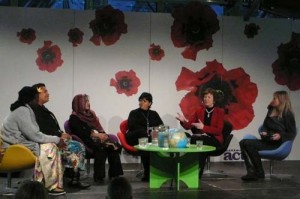Women, Hurt by Climate Change, Can Lead for Climate Justice
Emily Gertz is a freelance journalist, editor, and blogger covering the environment, technology, science, and sustainability. She reported on the Copenhagen climate talks on behalf of Oxfam America.
They say the impacts of climate change are “blind” to class, creed, or gender.
But activists in Copenhagen say, in reality, women in poor countries bear the brunt of global warming’s terrible human cost.
In the province of Balochistan, near the Afghani border, the shifting climate has been disastrous for traditional family structure and stability, according to Rehana Bibi Khilji. “The common woman in our area of rural Pakistan is very impacted,” said Khilji, founder of Balochistan human rights group Hope PK.

She was one of several panelists speaking before an audience of around 200 at today’s “Women’s Leadership on Climate Justice” program in Copenhagen — women who have seen firsthand the damage done by changing environmental conditions, agricultural cycles, and water supplies.
They included Constance Okollet of Uganda, who I wrote about a few days ago, journalist Ulamila Kurai Wragg of Cook Islands in the Pacific, and Lorena Aguilar Revelo of Costa Rica, a gender advisor with the global environmental NGO IUCN, and board member of the Women’s Environment and Development Organization (WEDO).
The panel also included former Irish President and human rights advocate Mary Robinson, and Elisabeth Moller Jensen, director of the Danish Center for Research on Women and Gender. Canadian Inuit activist Shelia Watt-Cloutier gave the keynote speech.
Rural families in Balochistan have traditionally been self-sufficient, Khilji told the audience of around 200 women, men, and youth. But unusual floods and droughts have taken a big toll on women’s kitchen gardens, poultry, and livestock, Khilji told the audience. These had been the women’s primary means of feeding their family and trading for goods. “Now they are more dependent on the outside market,” she said.
Less rain and snow have meant shortages of clean water for cooking and cleaning. And many men have left for the cities to earn money as wage laborers, sometimes forcing older sons to leave school to help their mothers. “She needs a male; women’s mobility is a great issue,” said Khilji.
Hope PK held a tribunal in late November, for women in Balochistan to offer testimony on the harms they’ve experienced from climate change, said Khilji. Organizing the tribunal also helped spread more awareness about climate change.
Ulamila Kurai Wragg, a journalist who has reported on climate change’s impacts on both Cook Islands and Fiji, emphasized that the people of her southern Pacific island nation had little to do with creating global warming, but are among those already feeling its effects the hardest.

“We are innocent,” she said. “We don’t produce any pollution at all.” Wragg noted that even as she was speaking, a major cyclone was hitting Fiji. “When we are hit with such drastic weather, how else can we react” but to try and get global action on climate change, she asked. “Science has proven it, it has spoken, there is something else that’s causing all this.”
Scientifically, it’s difficult to attribute any single weather or climate event in the present to global warming. Climate trends are often only visible after several years to gather and compare data with earlier spans of time.
But stronger storms, more destructive tides, and sea level rise are among the impacts that scientists have forseen as a result of the rising mean global temperature — all conditions now being experienced by small island nations in the Pacific and other parts of the world.
After the panel, Rehana Bibi Khilji told me that testimonies have been delivered to both provincial and federal government officials. As of this morning, she’s delivered them to Pakistan’s delegation to the United Nations climate negotiations as well.
“We make sure that through all channels these things go into the negotiations,” she told me.
The Pakistani delegation was “not very much satisfied” with the progress of the talks so far, she said. “Everybody is waiting for everybody else to jump in” and make commitments to cut their greenhouse gas pollution.
Khilji expects to learn within the next day or so how — or if — the information on women and climate change will be included in the delegation’s position at the negotiations.
I asked Lorena Aguilar Revelo what she and those she works with would be doing after Copenhagen, given the likelihood that a formal treaty won’t emerge from the negotiations.
They plan to “go national,” she said, and begin investing in climate change adaptation and mitigation projects that “show what works, literally on the ground…there is so little time left.”
She is determined that women’s needs be part of the climate finance agenda — a point that Mary Robinson also emphasized during the panel. “There is no way the new regime” of funding from rich nations to poor for climate adaptation and mitigation “is not going to come without gender issues in it,” Revelo said to me. “Not just for us, but for the thousands of women dying in hurricanes,” because they didn’t know how to read the weather conditions.
During the panel program, Mary Robinson uttered a phrase new to my ears: “the road to Mexico.” Some climate justice advocates, it seems, are already beginning to look ahead to next year’s scheduled climate treaty meeting.
I asked Khilji about this, and she began her answer by bringing the focus back around to what’s happening right now. “For us, the most important thing to come out of Copenhagen is the maximum, legal, binding treaty,” she said. “We don’t want just political slogans from here. We want the real deal.”
There’s still hope for an effective international treaty if that doesn’t happen, she suggested. But failure in Copenhagen will make the path to next year’s meeting in Mexico a lot rougher.